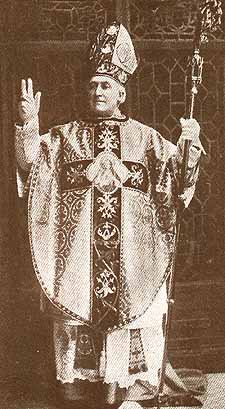Independent Catholicism
Independent Catholicism refers to those Christian denominations that identify with the Catholic Church's beliefs, traditions, and practices but operate independently from the Roman Catholic Church and its authority structures, such as the Pope and the Vatican. Independent Catholic churches often arise from theological, liturgical, or social disagreements with the Roman Catholic Church's teachings or practices. Despite their independence, these churches typically maintain sacraments and liturgical practices similar to those of the Roman Catholic Church. They may also emphasize inclusivity, social justice, and the ordination of women, which are contentious issues in mainstream Catholicism.
History[edit | edit source]
The origins of Independent Catholicism can be traced back to various movements throughout history, where groups or individuals felt that the Roman Catholic Church had deviated from its original teachings or had become too centralized. One of the earliest and most significant schisms occurred with the Old Catholic Church, which separated from Rome after the First Vatican Council in 1870 over the doctrine of Papal Infallibility. This movement laid the groundwork for the modern Independent Catholic movement, emphasizing autonomy from Rome while retaining Catholic liturgical and theological traditions.
Beliefs and Practices[edit | edit source]
Independent Catholic churches vary widely in their beliefs and practices. However, they generally adhere to the core doctrines of Christianity as expressed in the Nicene Creed. Many Independent Catholic communities place a strong emphasis on social justice, inclusivity, and the welcoming of marginalized groups, including the LGBTQ+ community, divorced and remarried persons, and women seeking ordination.
Liturgy in Independent Catholic churches often mirrors that of the Roman Catholic Church, with the celebration of the Eucharist, the Liturgy of the Hours, and the observance of the liturgical year. However, there may be significant variations in liturgical language, rituals, and inclusivity of language.
Governance[edit | edit source]
Unlike the centralized authority structure of the Roman Catholic Church, Independent Catholic churches are often organized in a more decentralized manner. Many operate under the leadership of bishops who claim apostolic succession but are not recognized by the Vatican. These communities may be congregational in governance, with a high degree of lay participation in decision-making processes.
Challenges and Criticisms[edit | edit source]
Independent Catholicism faces challenges in terms of recognition and legitimacy. The Roman Catholic Church does not recognize the sacraments administered by Independent Catholic clergy as valid, and there is often skepticism regarding the apostolic succession of their bishops. Additionally, the diverse nature of Independent Catholicism can lead to challenges in maintaining doctrinal unity and community cohesion.
Conclusion[edit | edit source]
Independent Catholicism represents a diverse and complex movement within Christianity, offering an alternative for those who seek to practice Catholic traditions outside the authority of the Roman Catholic Church. While facing challenges in terms of recognition and internal cohesion, these communities continue to thrive, providing a spiritual home for many who find themselves at odds with mainstream Catholicism.
Search WikiMD
Ad.Tired of being Overweight? Try W8MD's NYC physician weight loss.
Semaglutide (Ozempic / Wegovy and Tirzepatide (Mounjaro / Zepbound) available. Call 718 946 5500.
Advertise on WikiMD
|
WikiMD's Wellness Encyclopedia |
| Let Food Be Thy Medicine Medicine Thy Food - Hippocrates |
Translate this page: - East Asian
中文,
日本,
한국어,
South Asian
हिन्दी,
தமிழ்,
తెలుగు,
Urdu,
ಕನ್ನಡ,
Southeast Asian
Indonesian,
Vietnamese,
Thai,
မြန်မာဘာသာ,
বাংলা
European
español,
Deutsch,
français,
Greek,
português do Brasil,
polski,
română,
русский,
Nederlands,
norsk,
svenska,
suomi,
Italian
Middle Eastern & African
عربى,
Turkish,
Persian,
Hebrew,
Afrikaans,
isiZulu,
Kiswahili,
Other
Bulgarian,
Hungarian,
Czech,
Swedish,
മലയാളം,
मराठी,
ਪੰਜਾਬੀ,
ગુજરાતી,
Portuguese,
Ukrainian
Medical Disclaimer: WikiMD is not a substitute for professional medical advice. The information on WikiMD is provided as an information resource only, may be incorrect, outdated or misleading, and is not to be used or relied on for any diagnostic or treatment purposes. Please consult your health care provider before making any healthcare decisions or for guidance about a specific medical condition. WikiMD expressly disclaims responsibility, and shall have no liability, for any damages, loss, injury, or liability whatsoever suffered as a result of your reliance on the information contained in this site. By visiting this site you agree to the foregoing terms and conditions, which may from time to time be changed or supplemented by WikiMD. If you do not agree to the foregoing terms and conditions, you should not enter or use this site. See full disclaimer.
Credits:Most images are courtesy of Wikimedia commons, and templates, categories Wikipedia, licensed under CC BY SA or similar.
Contributors: Prab R. Tumpati, MD


